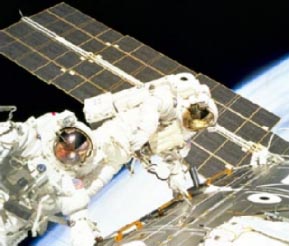But it didn't stop there, we began to explore the other planets, first the outer planets with the Pioneer- and Voyager missions and later the inner planets. We landed on Mars with the Viking missions and later the Pathfinder mission, with its Mars rover Sojourner. In 1990 we turned one of the Voyager probes around to make a photo of our own solar system. Today we still launch probes into space to explore the universe, think about ESRO-2, EXOSAT, today the Hubble Space Telescope (HST), ISO, recently we have launched Chandra. And we still have plans to launch more astronomic satellites into earth's orbit, for instance the XMM (X-ray Multi Mirror telescope) Almost every day we unravel more mysteries, we see more things than ever before.

How would life be without space-based astronomy? We wouldn't have the HST, COBE or Chandra. We wouldn't have proof for the Big-Bang theory, or an expanding universe. We simply wouldn't know what is happening out there. Astronomy is like a universal language, it doesn't matter what language you speak, what religion you have or political faith, everyone who sees an astronomic photo knows exactly what it is, or what is meant. The search for the unknown unites people, scientists and astronomers from all over the world work together to achieve certain goals and to discover the undiscovered. Everything they see and maybe the things you see and measure are things of thousands of years old. It literally takes you back in time. If you look up into the dark sky on a clear night you see and feel the same things your ancestors did. Astronomy goes totally beyond your imagination e.g. if you'd hold a grain of sand, the ?next star? would be more than 40 kilometers away. Our research on the cycle of life of stars and other objects eventually give us answers to questions like, how did the universe begin and when will it end? Will it end or will it keep expanding? Things like that. It helps us in our understanding of our existence and our quest for knowledge.
Developments in space have led to the production of new materials, and new techniques. Materials that can be used in fire fighting, treatments for ill people, or special procedures for complicated operations. Those kinds of developments save lives and they eventually help you one way or another. Cleaner energy sources to prevent global warming, like solar energy, wouldn't be developed if it wasn't for 'our' satellites. So, what you could say is if we wouldn't have had space-based astronomy or space travel, we would have missed a great number of things.
Click here to go back to the XMM Winners' Page